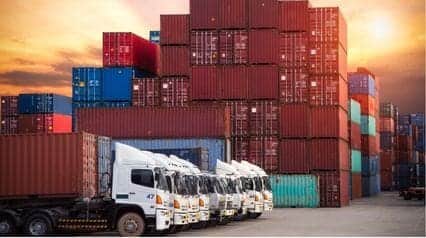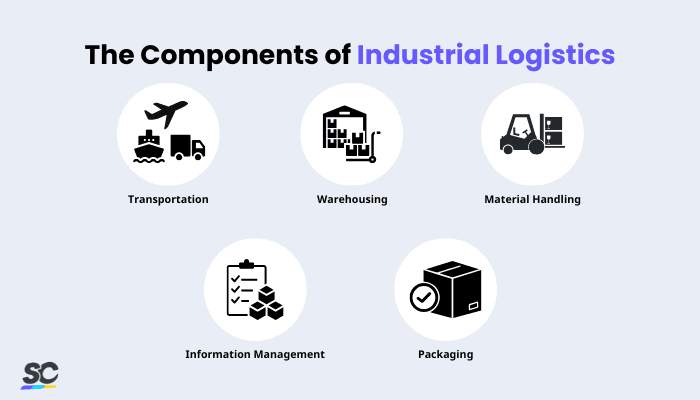Industrial Logistics: What You Need to Know
Industrial logistics is a highly specialized area of business. Here, you’ll find all the information you need to understand the field.

Published 10 Oct 2025
Article by
4 min read
What is Industrial Logistics?
Industrial logistics is the process of planning, implementing, and controlling the flow of resources and materials between the point of origin and the point of consumption in order to meet the needs of customers or clients. It includes coordinating transportation, storage, distribution, and other activities related to the movement of goods.
It encompasses the entire supply chain from the acquisition of raw materials through production and distribution to the delivery of the final product to the customer. Industrial logistics is a critical part of the manufacturing process and can have a significant impact on the overall efficiency and effectiveness of the operation.
What is its Purpose?
The goal or purpose of industrial logistics is to optimize the efficiency of the overall supply chain and create a competitive advantage for the company. In order to achieve this, industrial logistics must take into account the specific needs of the company, the nature of the products being transported, and the specific conditions of the transportation network.
Below are some of the following activities involved in industrial logistics:
Planning and designing the distribution network
Maintaining a robust inventory management system
Coordinating transportation schedules
Ensuring that products are delivered on time and in good condition
Minimizing waste and maximizing resources
Digitize the way you Work
Empower your team with SafetyCulture to perform checks, train staff, report issues, and automate tasks with our digital platform.
Principles
Industrial logistics is governed by the following three principles when used in a business:
1. Market Constraints
In order to be successful, businesses need to understand and respond to the limitations and opportunities posed by the markets within which they operate. This includes understanding global and local market conditions, such as fluctuating demand, return processing, and more.
2. Technical Constraints
There are certain physical limitations that businesses need to take into account regarding logistics planning. This may include the size and shape of products, transportation mode restrictions, and storage constraints.
3. Operational Constraints
Businesses need to consider their own internal capabilities and limitations when devising a logistics plan. This may include the business’s financial resources, information systems, labor availability, and so on.
What are the Components of Industrial Logistics?

The Components of Industrial Logistics
So how does logistics work in the context of industrial logistics?
To put it simply, logistics is the coordination of transportation, warehousing, and materials handling to control the flow of resources between points of origin and consumption, according to the Michigan State University. This process can be broken down into five distinct components:
Transportation - Transporting goods, materials, and products from suppliers to manufacturers or manufacturers to customers
Warehousing - Storing raw materials and finished goods until they’re needed for production or delivery
Material Handling - Moving and managing materials safely within a site or during transport to prevent damage
Information Management - Coordinating and tracking logistics data to keep the supply chain running smoothly and visible end-to-end
Packaging - Preparing goods for safe storage, easy handling, and secure transport, while maintaining brand presentation
What are its Examples and Practical Applications?
Below are some examples and practical applications when industrial logistics is applied in business:
1. Manufacturing
In order to streamline production and decrease waste, many manufacturers use industrial logistics to plan and optimize their production process. This includes planning for raw materials, production equipment, and workforce needs. By doing so, factories can produce goods more efficiently and with less waste.
2. Retail
Retailers also use industrial logistics to plan and optimize their supply chains. This includes planning for inventory levels, transportation needs, and store layout. By having a well-planned supply chain, retailers can provide customers with the products they want while minimizing costs.
3. Service Industry
Industrial logistics can also be used in the service industry. For example, hospitals can use industrial logistics to plan for patient flow, staff assignments, and supplies needed. By having a well-planned system, hospitals can provide better care for patients while minimizing costs.
4. Hospitality
Managing hotels, resorts, and restaurants means staying on top of food and ingredient supply. Logistics play a key role in keeping the service running smoothly. This includes coordinating food and beverage deliveries, housekeeping, guest services, and maintenance. With the right logistics in place, your team can run more efficiently and keep guests satisfied.
Streamline Industrial Logistics with SafetyCulture
Why Use SafetyCulture?
SafetyCulture is a mobile-first operations platform adopted across industries such as manufacturing, mining, construction, retail, and hospitality. It’s designed to equip leaders and working teams with the knowledge and tools to do their best work—to the safest and highest standard.
Streamline processes, eliminate bottlenecks, enhance resource utilization, and build an agile and scalable infrastructure with SafetyCulture. Strive for operational excellence to boost competitive advantage, foster sustainable growth, and deliver long-term value.
Save time and reduce costs
Stay on top of risks and incidents
Boost productivity and efficiency
Enhance communication and collaboration
Discover improvement opportunities
Make data-driven business decisions
FAQs for Industrial Logistics
Article by
SafetyCulture Content Team
SafetyCulture Content Contributor, SafetyCulture
View author profileRelated articles
Operations
Business Processes

Understanding the Importance of Process Automation Reliability
Learn how reliable process automation is key to safe, consistent operations and how it minimizes quality and compliance risks.
Logistics
Operations

Transportation and Logistics: What’s the Difference?
Learn about the importance of transport and logistics within the supply chain and how it is used in business operations.
Logistics
Operations

An Overview of Transport Network Analysis
Learn about transport network analysis and how network-level insight improves reliability and reduces operational risk.